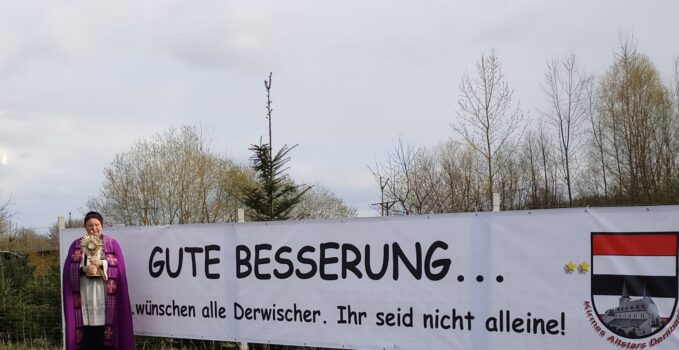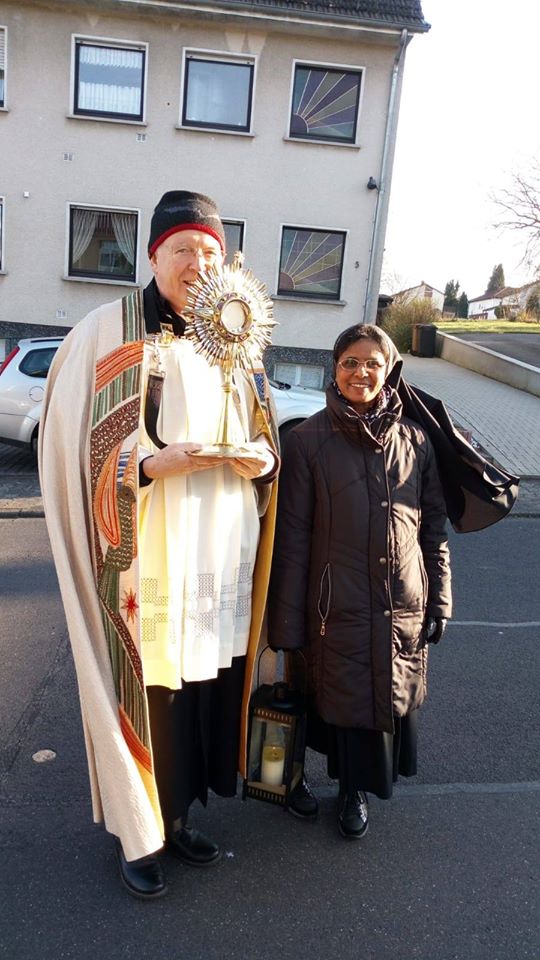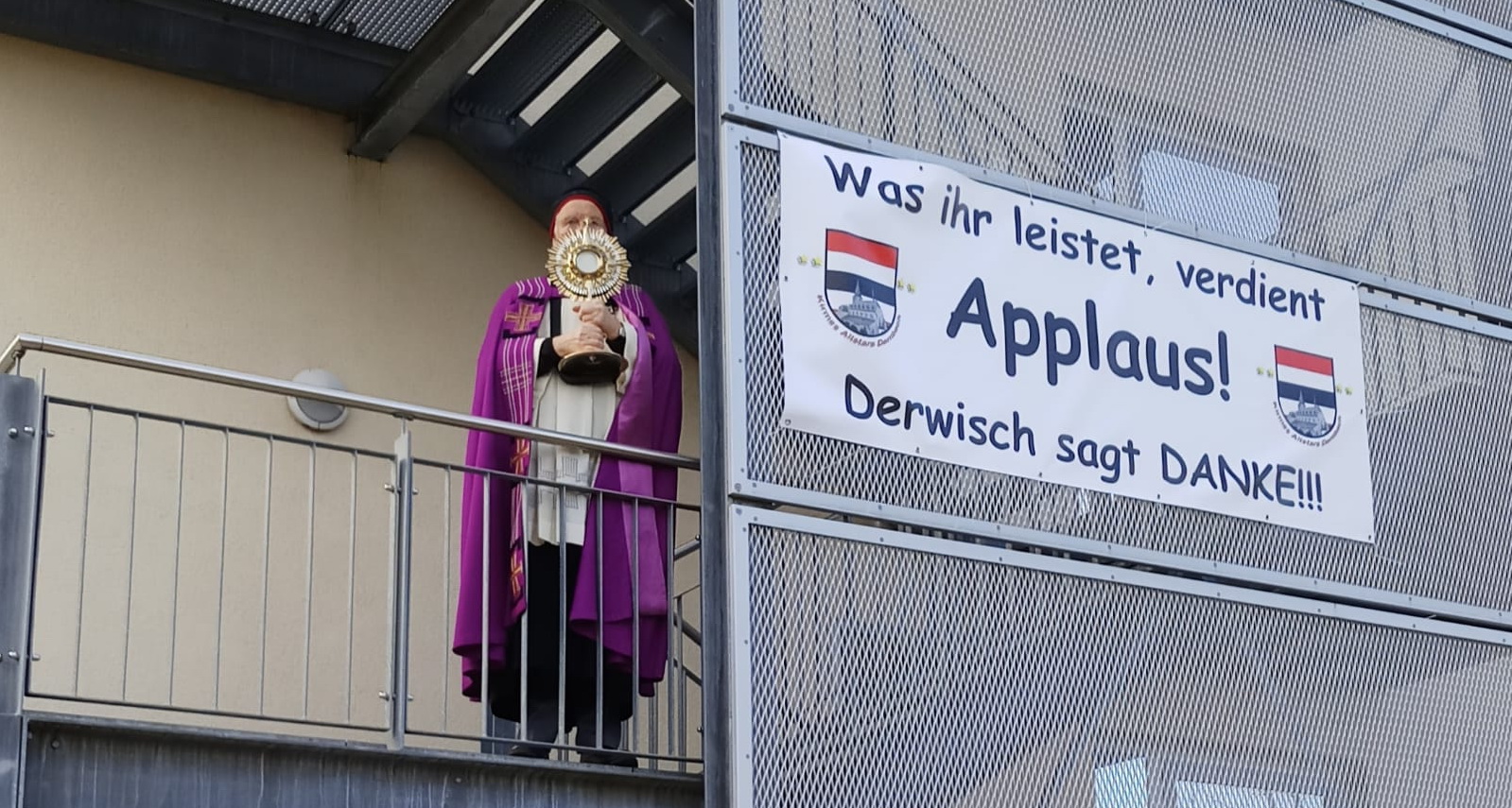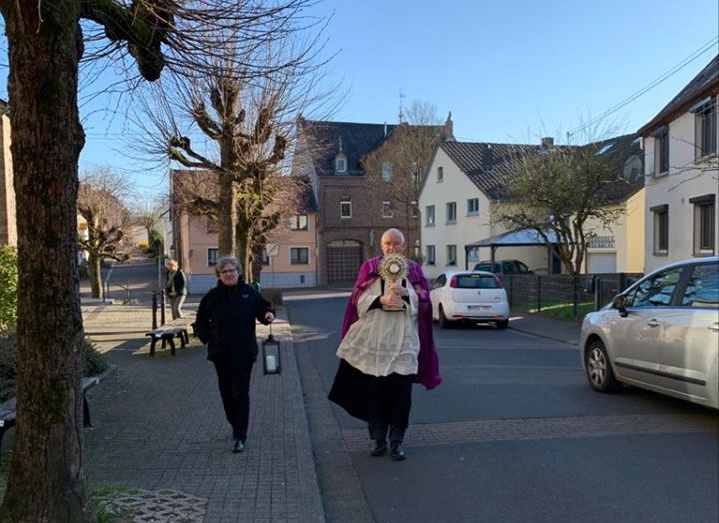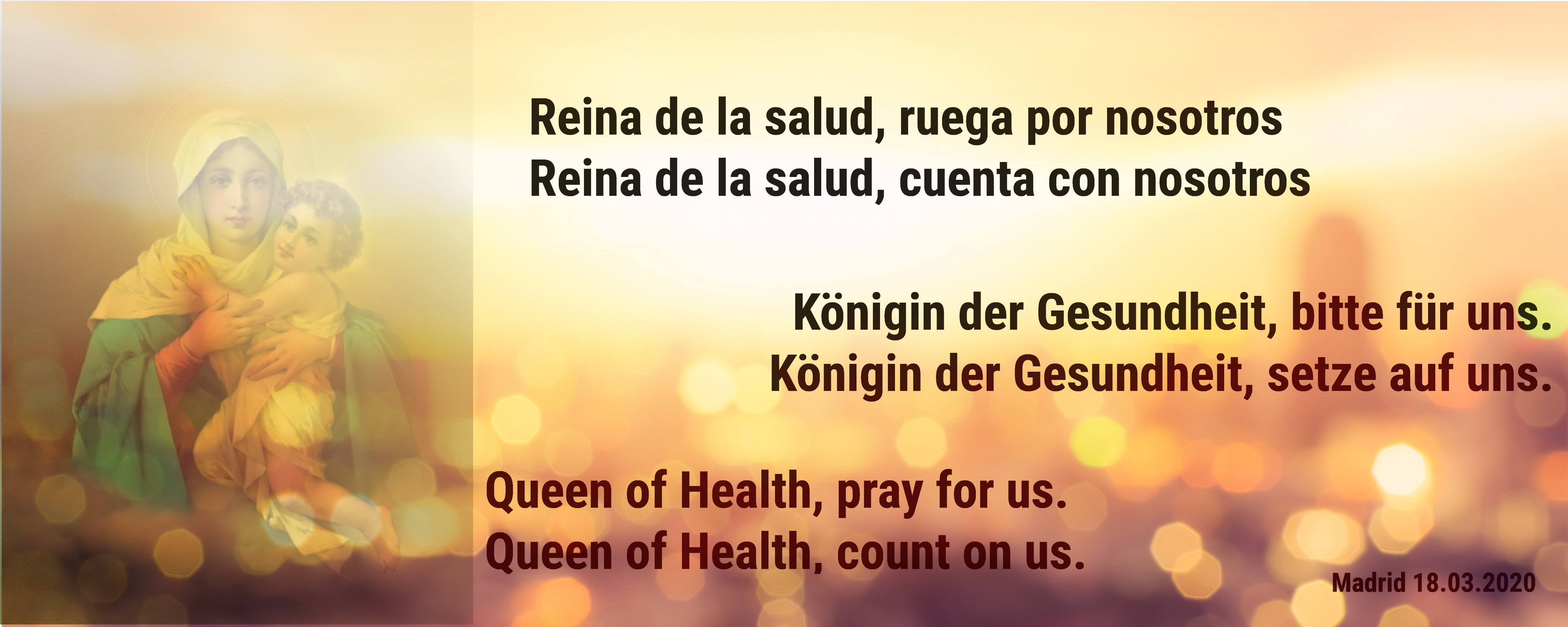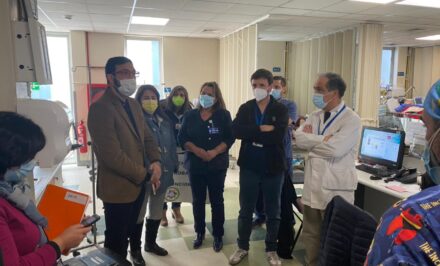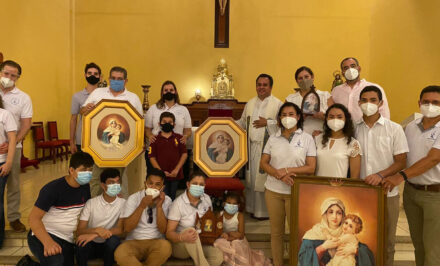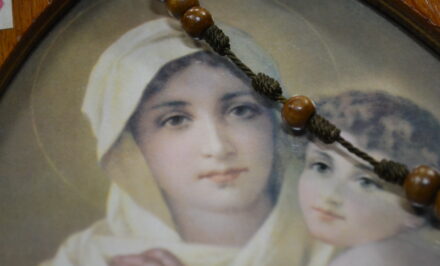ÜBERLEGUNGEN UND EIN KONKRETES TUN IN ZEITEN VON CORONAVIRUS, von P. Elmar Busse •
The Rhein-Zeitung reported about it this week. Today, on the 5th Sunday of Lent, he did it again. In Germany, walking alone or in pairs is allowed. He walked in twos, in Dernbach, where he worked: Father Elmar Busse, Schoenstatt Father, or in reality three: together with Jesus Christ in the monstrance. Why he does this and what it means for him, he wrote down for schoenstatt.org. —
When God revealed His name to Moses at the burning bush: I am him “I am here”, a new chapter of God’s salvation and covenant history with mankind began. We can read about it in the book Exodus 3:14. The encounter between God and Moses at the burning thorn bush has given Jews and Christians, especially in times that had been characterized and deplored as phases of God’s concealment or as an eclipse of God, new hope and security time and again and incited them to seek this hidden God all the more intensely.
Of course, in such times there were also people who could not bear the emptiness of God and consoled themselves with creaturely, sensual realities or at least filled this emptiness. This begins with the dance around the golden calf (Exodus 32) and can be observed today in the sprinkling of soap operas and, at worst, in the consumption of drugs.
The well-known Viennese trend and future researcher Matthias Horx invites us in view of the Corona crisis with an interesting thought experiment, which he calls “re-forecasting” (in contrast to the “prognosis” we are familiar with). We catapult ourselves into the future and look back from there to the present. Looking back at the corona crisis at the end of 2020, what could we perhaps observe in amazement?
What will we be surprised about?
“What will we wonder about in hindsight?”
We will be surprised that the social sacrifices we had to make rarely led to loneliness. On the contrary. After an initial state of shock, many of us were even relieved that all the running, talking, communicating on multichannels suddenly came to a halt. Renunciation does not necessarily mean loss, but can even open up new possibilities. This has been experienced by many people who tried interval fasting, for example – and suddenly enjoyed the food again.
Paradoxically, the physical distance forced by the virus simultaneously created new proximity. We got to know people we would never have met otherwise. We contacted old friends more frequently again, strengthened ties that had become loose and slack. Families, neighbours, friends, moved closer and sometimes even solved hidden conflicts…
The social graciousness that we had previously increasingly missed increased…
At the same time, apparently outdated cultural techniques were experiencing a renaissance. Suddenly you didn’t just get an answering machine when you called, but real people. The virus brought about a new culture of long distance telephoning without second screen. Even the “messages” themselves suddenly took on a new meaning. One communicated again in a real way. You didn’t let anyone fidget anymore. You didn’t string people along anymore. Thus a new culture of accessibility was created. Engagement.
People who never calmed down from the hectic pace of life, even young people, suddenly went for long walks (a word that was rather a foreign word before). Reading books suddenly became a cult.
Reality shows suddenly seemed embarrassing. All that trivia trash, all that endless soul garbage pouring through all those channels. No, he didn’t disappear completely. But he was rapidly losing value.
Does anyone remember the political correctness controversy? The endless culture wars over… yes, what was that about?
Crises are effective above all in that they dissolve old phenomena, make them superfluous…
Cynicism, that casual way of keeping the world at arm’s length through devaluation, was suddenly abundantly out.
The exaggerated fear-hysteria in the media was, after a short initial outburst, kept within limits”[1].
I invite you to read the whole text by him. I would just like to take up the suggestion that from a future distance we can overcome the focus on the current crisis. The danger of manoeuvring oneself into a problem trance is drastically reduced by this thought experiment.
How do we deal with the current situation?
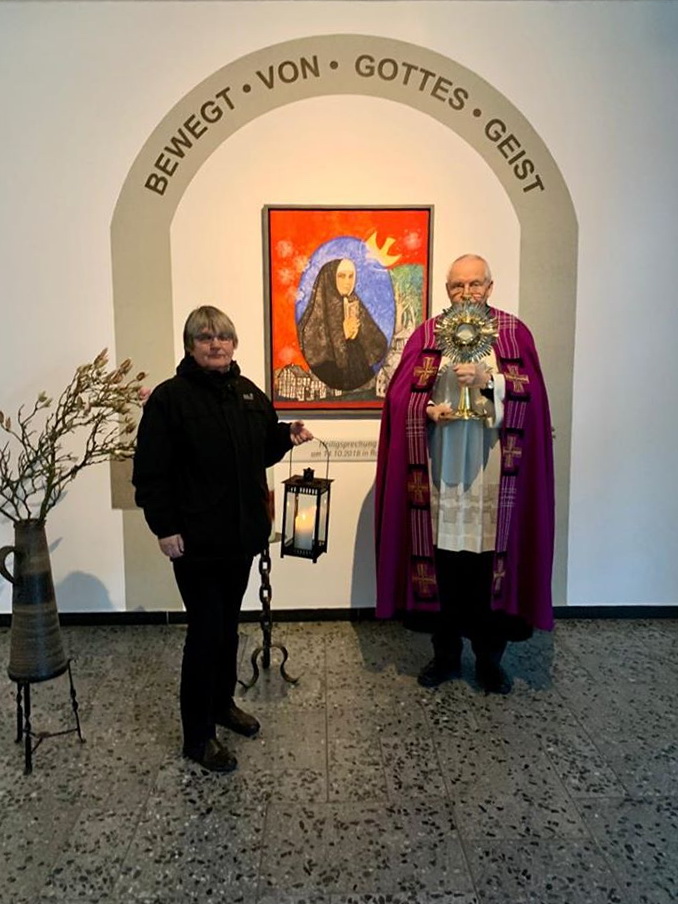 Nevertheless, the question remains: How do we deal with the situation now? Viktor Frankl has pointed out to us that we are beings who seek meaning. Man can become ill with senselessness. The Logo-Therapy (from the Greek Logos = the word, the sense) developed by him starts exactly there. The therapist accompanies the person seeking meaning so that he or she can give meaning to a situation which at first sight seems senseless and which he or she despairs of; a meaning which is not necessarily so comprehensible to others, but which is coherent for the person concerned and thus comforting, encouraging and giving peace.
Nevertheless, the question remains: How do we deal with the situation now? Viktor Frankl has pointed out to us that we are beings who seek meaning. Man can become ill with senselessness. The Logo-Therapy (from the Greek Logos = the word, the sense) developed by him starts exactly there. The therapist accompanies the person seeking meaning so that he or she can give meaning to a situation which at first sight seems senseless and which he or she despairs of; a meaning which is not necessarily so comprehensible to others, but which is coherent for the person concerned and thus comforting, encouraging and giving peace.
Do not try to use too bold patterns of interpretation
I occasionally encounter another attempt at interpretation: the pandemic as God’s punishment.
I recall a conversation with a Protestant work colleague who once said: “God rewards the good and punishes the bad.” Unfortunately, it’s not that simple. Already in Psalm 73 we feel the need of faith of the prayerful, because he sees that the wicked are doing so well and the good often so bad. Especially in the meditation book Job the question of innocent suffering is meditated in all directions. The “consolers” who come to Job only make his suffering even greater, because they insinuate that he must have done something bad, if one stroke of fate after the other now hits him. At the end of the book, God makes it clear to Job that the Comforters have not understood anything about the way God treats man.
Also in the Gospel of the 4th Sunday of Lent we can reconstruct the simple world view of the disciples from their questions to Jesus. Then his disciples asked him, “Rabbi, who has sinned? He himself? Or have his parents sinned so that he was born blind? Jesus answered, “Neither he nor his parents sinned, but the work of God shall be revealed in him.” (Jn 9:1-3) – That destructive behavior produces destruction is the consequence, but not an extra punishment. He who sows hatred will reap war. We should therefore be cautious and restrained in trying to use this all too simple pattern of interpretation in order to be able to classify the situation for ourselves.
It is the hour of the Home Shrine
And yet the question remains: How do we react to the Corona crisis? Naturally, we functionally take into account all the advice of the virologists and the commandments and prohibitions that the political leaders enact after careful consideration and at the discretion of the population. But beyond that? How can we react mentally and emotionally as believing Christians?
It is the hour of the Home Shrine.
The custom of living with a Home Shrine has promoted piety in many families around the world, combined with a more intimate spiritual closeness.
Therefore I can only agree with the Erfurt dogmatics professor Julia Knop when she writes
“At present people are creatively and independently finding new forms of prayer and solidarity that connect them with each other and with God. Members of different denominations and religions articulate their life before God in thoughts, words and works. They attribute to Him their insecurity, their loneliness and their dead. With the candle in the window, prayer or worship at home, a different, deinstitutionalized and interdenominational way of being a Christian and a church or simply a believer in God is created”[2].
Regarding the two terms used by Prof. Knop, “deinstitutionalized” and “interdenominational”, I remember that at a meeting of the ecumenical network of spiritual movements, which has been on the road since 1998 under the label “Together for Europe”, a representative of a Free Church once said: “You Schoenstatters are much more like Free Churches in your hearts than you dare to admit! This was preceded by the testimony of a married couple living at home with their family in the Home Shrine.
Besides the typical home shrine customs within the Schoenstatt Movement, I would like to point out a historical example:
Blaise Pascal had his most intense experience of God, lasting about two hours, in his apartment, on November 23, 1654, at night. Of course he was also a diligent churchgoer and passionate co-celebrator of the Eucharist. But he received the special gift at home. Immediately afterwards he recorded his thoughts and feelings in note form on a parchment which he sewed again and again between the lining and cover fabric of his jackets so that he could wear it close to his heart.
With all the appreciation of the Eucharistic celebration – there must be no fixation of the sacraments.
In Japan, Christianity has survived 250 years through baptism, the sacrament of marriage, prayer, active charity and the readiness to martyrdom alone. From the crucifixion of the Christians in Nagasaki on February 5th 1597, the expulsion of all missionaries in 1614 up to the rediscovery of the “hidden Christians” in Japan on March 17th 1865 this time of suffering of the Japanese faithful lasted. In the Japanese liturgical calendar, March 17 is celebrated as the day of the memorial of Our Lady of the meeting with the Japanese faithful. God is very creative to meet us and let us experience His closeness. Let us give Him the chance to meet us in an unusual way!
Church life goes on – Of course!
That is why I found the headline “Church life comes to a standstill”[3] simply too superficial. This selective perception overlooks the many intense prayers of individual believers or families; it overlooks the practical charity of many Christians who are involved in medical institutions, commerce and elsewhere.
I find the term “ghost measuring”[4] equally questionable. For some years now the term “ghost driver” from traffic radio has been replaced by the term “false driver”. Should one rather speak of “proxy masses” instead of “ghost masses”? Since my altar boy training in the early 60’s the deputy idea played an important role. We altar boys were the deputies for the whole community in the chancel. That has not changed with the deacon and priest ordination. According to the Catholic understanding of the sacraments, the ordination to the priesthood also gives the possibility to act in persona Christi. Otherwise, I wouldn’t be able to say, “This is my body” when I pronounce the ordination. I’d have to say, “This is the body of Christ.” But this does not mean that the deputy’s job is over. In the second high prayer, the priest prays: “We thank you for calling us to stand before you and serve you.”
In our present situation a look at St. Therese of Lisieux is also helpful. Why was she able to become the Patroness of World Mission, who never left the enclosure after entering the Carmelite convent of Lisieux?
She meditates in her autobiographical writings:
“My vocation is love! … Yes, I have found my place in the church, and this place, my God, you have given me. . . in the heart of the Church, my Mother, I will be love… In this way I will be everything… In this way my dream will come true! …“
We know the slogan “Think globally – act locally.” Therese of Lisieux lived a Christian variation of this slogan. Spiritually, she had this wide horizon, this boundless longing. At the same time, she knew her God-given place behind the monastery walls. Therese has thus opened up a path for us that is also possible for us with the presently imposed restrictions. Only outwardly and formally does the spectre of a salvation-individualism rise, of which some theologians warn. If we strive to broaden our horizons in Theresia, the balancing act between praying in a quiet chamber and the need of the whole world that we bring before God, no mission is impossible.
Then Jesus comes to the people
When the faithful cannot come to the church for the Eucharist, Jesus comes to them in the form of the Eucharist. With Sister Barbara, I walked for an hour last Sunday through the streets of Dernbach to bless passers-by – if they so wished – extra; we also met “my” child Ben (25.1.2020) who I baptized with his parents; we were made aware of a birthday in the neighboring house and gave a special to the person celebrating, for whom this was a great joy, especially since the grandchildren could not come to celebrate today.
I am the “I AM HERE” – this is how God revealed Himself to Moses at the burning bush. To let the omnipresence of God be experienced with all your senses in the Eucharist – that is a sign of hope and comfort.
After the beautiful experiences of Sunday, today, March 25th, I went again with the monstrance blessing through Dernbach. This time Sister Lizzy accompanied me. A man, who had just come home by car, asked us to go on out next house visit to his sick mother, who cannot leave the house because of spinal problems. She felt it was a special gift.
On Sunday, March 29, I again went through Dernbach with Sister Lizzy blessing and praying the Rosary of Mercy. This time we met, among others, a five-year-old birthday boy with his three-year-old brother and mother standing in the front door, two meters in front of him his kindergarten friend with mother, who congratulated. So we did not miss the opportunity to sing a birthday song as well. Some people from Dernbach, who saw us through the window, came out into the garden and asked for a blessing.
In the meantime, posters at and near the hospital were also put up, on which the Dernbach residents address the medical staff and pay tribute to their commitment. A “Get well soon” poster was placed in such a way that the patients on the east side of the hospital could read the encouragement through the window.
Encouragement – that was also the keyword, as many a passer-by appreciated and rejoiced at our efforts with the monstrance. That is why I cannot understand the critical questioning of Prof Julia Knop. She wrote: “Neither holy water nor host have a virucidal effect. And not everything that is permitted and was once commonplace decades ago is useful today”[5].
The enlightening pathos with which they have to name the lack of medicinal effect fits more into the 19th century than into a commentary in the 21st century. Both I as the giver and the Dernbacher as the recipient of the blessing are not susceptible to a magical understanding of sacramentalism. We can very well distinguish between the functional level and the relational level. In the distress and irritation of an exceptional situation never experienced before, it is simply good to experience the closeness and love of God in a meaningful way. How often have I pointed out in marriage preparation courses and family meetings that invisible love is dependent on meaningful signs, forms of expression and explanatory and interpretative words. Otherwise it is not or only with difficulty perceived by the recipient.
Here again a side view of a saint, this time Don Bosco. “Young people should not only be loved, they should also feel that they are loved,” said Don Giovanni Bosco (1815-1888), the youth pastor of Turin, in his letter from Rome, written on May 10, 1884. In it Don Bosco appeals for a pedagogy of participatory presence and love. “Without cordiality and familiarity, love does not show itself, and without this proof of love, there can be no trust.”
In the Eucharist we are given an opportunity for a meaningful encounter with Christ, which is not limited to communication, but is also possible in the faithful contemplation and veneration of the consecrated host. Already John can write: “What was from the beginning, what we have heard, what we have seen with our eyes, what we have looked at and touched with our hands, we proclaim: the word of life. (1 John 1,1)
Of course, to see faith, the special presence of Christ in the consecrated host must be added. Both together become a faithful experience.
So if on the one hand the home of basic religious practices in the family becomes again the basis of religious life and on the other hand the possibilities that have proven themselves in tradition and are also understood in their symbolic nature, then one need not play the forms off against each other.
Or, as the Rhein-Zeitung reporter writes:
A blessing in the Corona time: Pastoral care on the street, with which Father Busse works true miracles these days.
I am here.
Photos: Sister Lizzy Anthonappa
[1] Source:https://www.horx.com/48-die-welt-nach-corona
[2] https://theologie-aktuell.uni-erfurt.de/warnung-vor-retrokatholizismus-knop/
[3] https://www.kath.net/news/70966
[4] https://www.tag-des-herrn.de/debatte-um-geistermessen-waehrend-der-corona-pandemie
[5] https://theologie-aktuell.uni-erfurt.de/warnung-vor-retrokatholizismus-knop/
Original: German 30.03.2020 Translation: Lindsay Burger, Ohio, USA


